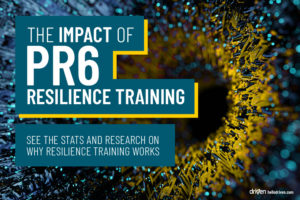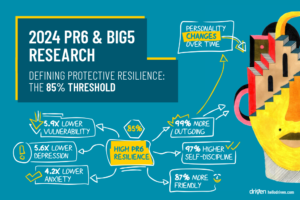In our research we systematically tested over 100 resilience measurement questions with 617 people. From the tens of thousands of data points, we validated which questions best measure the six domains of resilience and resilience overall.
But what if you wanted to quickly get a feel for your (or someone else’s) resilience?
Why measure?
Areas where we can improve resilience usually sit in blind spots. This means we tend to feel like we are resilient, even though there are areas to work on. Measurement, quite simply, helps to make us aware of where we have opportunities to improve.
Having areas to improve is not a bad thing – after all, we all start from almost zero resilience at birth, then grow from there at our own pace.
Awareness is the crucial step. Once we know where our opportunities are, only then we can start building.
The measurement system
Our psychometric scale is called the Predictive 6 Factor Resilience Scale (PR6). The short version of the PR6 that we use with businesses and coaches is 16 questions long. It’s fast, can be done in about three minutes, and provides insight into all six domains to find where to focus attention.
We have a longer version called the PR6-50, which is 50 questions long and is used for research projects, mainly at universities – useful if you want more granularity.
While the PR6-50 has high accuracy, what if you could get a meaningful insight with just two questions?
The PR6 Proxy
While drowning in stats and analysis, we got curious about this idea of two questions as a proxy for resilience. If we could find something like this, then it gives us a fast way to check in with ourselves.
We tested different combinations, mining all the highest correlation questions. Eventually, we found two questions that gets close to the accuracy of 50 questions!
These two questions alone predict overall resilience with 76% accuracy, compared to asking 50 questions.
Interestingly, both these questions relate to the Vision domain – which is about your sense of purpose and goals. Here, the questions relate to your ability to self-motivate and your perceptions of your own self-efficacy. We noticed as well from our previous research that the Vision domain also has the highest impact on job satisfaction, so it seems this really is the most important domain of resilience!
Two questions
Click the button to spot check your resilience – plus get an explanation of your results!
You can also add your results up manually below:
Think about how you’ve been over the last two weeks, and rate how much you agree with the following two statements:
“I struggle to stay motivated”
1 – Very much like me
2 –
3 –
4 –
5 – Not at all like me
“I believe in my ability to achieve my goals”
5 – Very much like me
4 –
3 –
2 –
1 – Not at all like me
Give yourself a score based on the numbers for each answer. Note that one is reverse ordered!
Add the two numbers together. This gives you a rough indication of resilience out of 10. The benchmark is around 7, so how did you do?
Keep in mind this is an estimate. Also, whatever you scored, know that this is only a starting point. Resilience can always be improved!
Psychologists & Coaches
These questions may be useful in your counselling sessions to slip in and check if someone might be struggling with low resilience. Check out this article on measurement if you’re interested in the science behind all this.
All the best,
Jurie Rossouw




